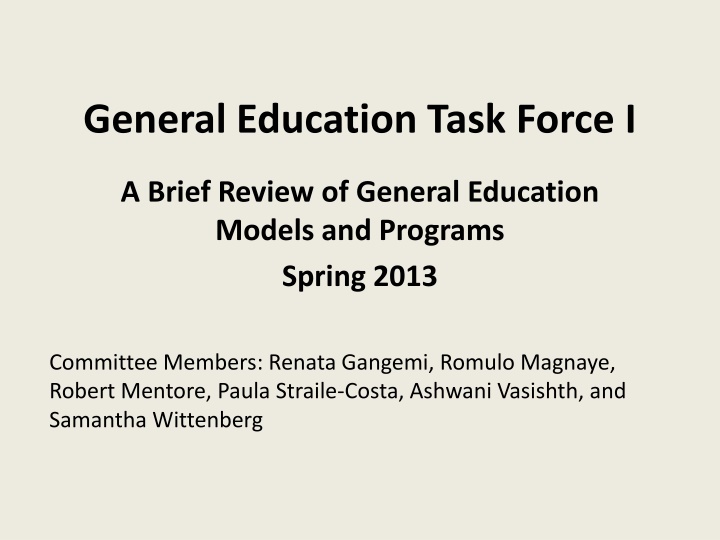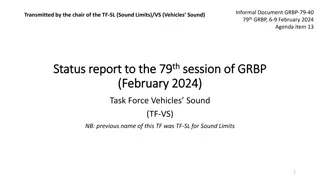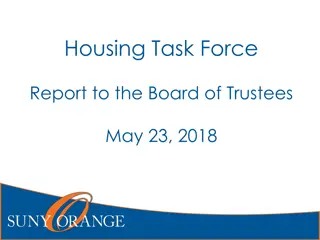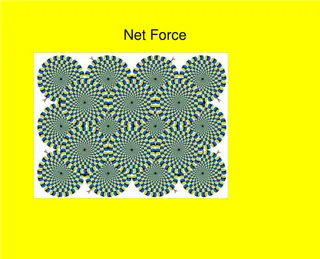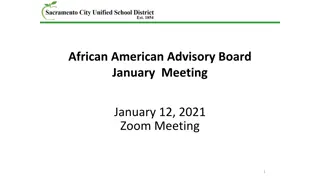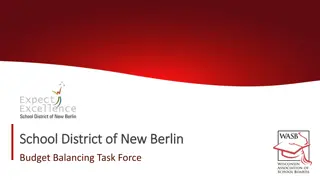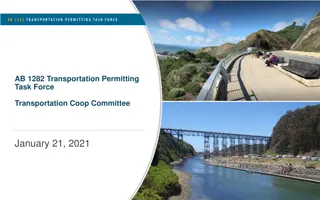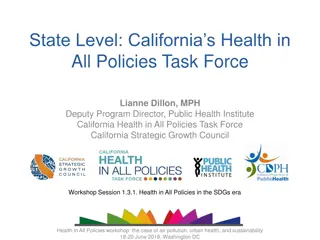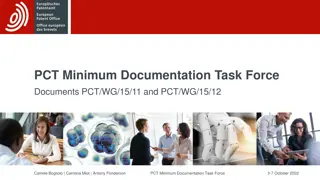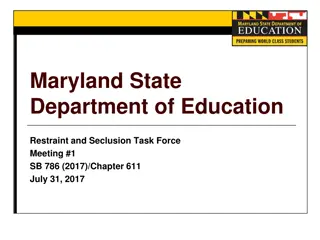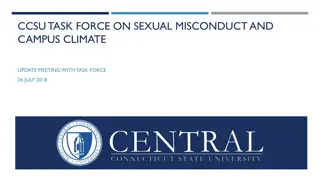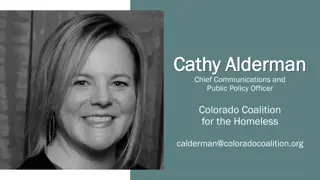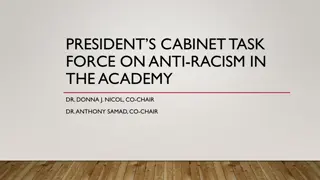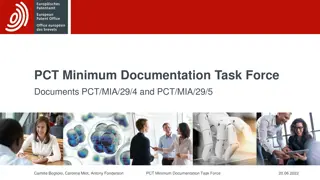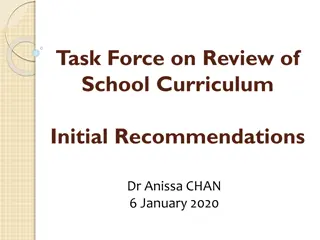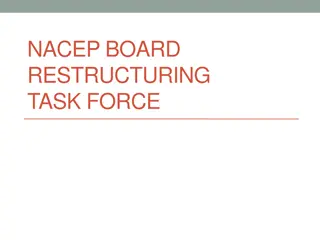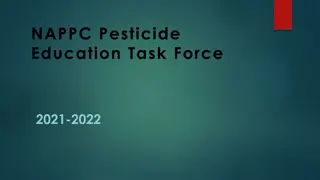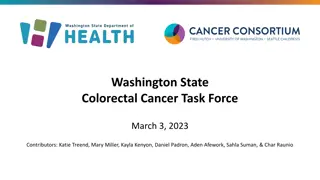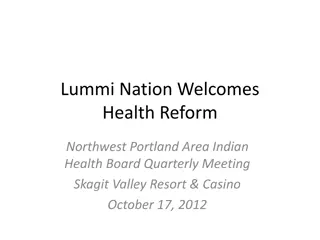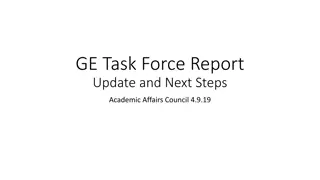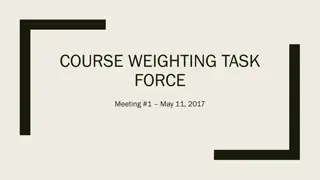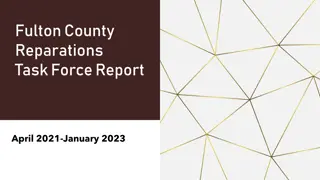General Education Task Force I - Review and Recommendations
The General Education Task Force I conducted a brief review of general education models and programs, focusing on broad education goals beyond high school, intellectual and moral development, critical thinking skills, and preparation for upper-level studies. The committee outlined best practices including alignment of goals, outcome-based approaches, faculty involvement, integration into students' study programs, and emphasis on lifelong learning and citizenship. Recommendations include building on existing structures or creating new ones, all guided by institutional missions and supported by faculty commitment.
Download Presentation

Please find below an Image/Link to download the presentation.
The content on the website is provided AS IS for your information and personal use only. It may not be sold, licensed, or shared on other websites without obtaining consent from the author.If you encounter any issues during the download, it is possible that the publisher has removed the file from their server.
You are allowed to download the files provided on this website for personal or commercial use, subject to the condition that they are used lawfully. All files are the property of their respective owners.
The content on the website is provided AS IS for your information and personal use only. It may not be sold, licensed, or shared on other websites without obtaining consent from the author.
E N D
Presentation Transcript
General Education Task Force I A Brief Review of General Education Models and Programs Spring 2013 Committee Members: Renata Gangemi, Romulo Magnaye, Robert Mentore, Paula Straile-Costa, Ashwani Vasishth, and Samantha Wittenberg
Caveat Our review is cursory at best, given the time constraints We limited our review to the level of categories, and did NOT drill down to the course level Our work should be the start of a process of exploration, not the end of it
Purpose of General Education (K. Waltzer, 2000) To become broadly educated (beyond the high school level) To begin to develop intellectual and moral imagination To become acquainted with different ways of knowing To increase capacities to think critically and independently To prepare for upper-level work in the disciplines To develop capacities generally useful to life and freedom, independent learning, and citizenship
Orientation There are two broad courses open to Ramapo College, in considering its General Education Curriculum: 1. Build on our existing structure, and strengthen it 2. Erect a new structure entirely
Best Practices (retrieved from University of Wisconsin-LaCrosse General Education Committee website: http://www.uwlax.edu/gened/Committee.htm) Whichever course we choose to take, we recommend the following: 1. Intentional (alignment among goals, outcomes, actions, results) 2. Based on institution s mission and broad goals 3. Outcome based (curriculum, pedagogy, assessment derived from expected outcomes) 4. Receives institutional support in terms of student learning, resource allocation, and faculty reward structure
Best Practices Continued 5. Faculty generated and with faculty endorsement and commitment (regular input from the faculty) 6. Integrated into the major or student s program of study (across the baccalaureate degree) 7. Focuses on development of life-long learning and developing knowledge, skills and dispositions for participation as a citizen (in a democracy and globally) 8. Emphasis on integration or making connections across courses/disciplines
Best Practices Continued 9. Is viewed as one piece of a liberal education, not the totality of a liberal education 10.Best faculty teach in the program 11. Based on active learning 12. Assessment is integral to the program (embedded assessment & programmatic assessment) 13. Accountability for student learning
Existing Gen Ed Model Core Courses: First-Year Seminar Critical Reading and Writing II Readings in the Humanities Social Issues or Perspectives in Business in Society
Existing Gen Ed Model Continued Distribution Categories: History Mathematical Reasoning Science with Experiential Intercultural North America International Issues Topics: Arts and Humanities or Social Sciences
Existing Gen Ed Model Continued http://www.ramapo.edu/provost/ce- resources/ http://ww2.ramapo.edu/facultystaff/fa/gecco /reports/Gen-Ed-SLOs-CurriculumMap.doc
Classic Gen Ed Models (R.R. Newton, 2000) Great Books liberal arts colleges Scholarly Discipline Research-oriented universities Effective Citizen institutions with client- centered/public mission orientation
Classic Gen Ed Models (R.R. Newton, 2000) Model Great Books Scholarly Discipline Effective Citizen Perennial human questions Accumulated wisdom and ways of understanding the world Service to a self- reforming democracy Key Insight Unified historical review of responses in Western tradition Key concepts and methods to be pieced together by students as a mosaic of disciplines Knowledge and skills to prepare students for a modern society Curriculum Looks to past enduring ideas Understanding intellectual treasures and methods Develops tools and commitment Orientation Broadly educated generalist Disciplinary experts Specialists educating non- specialist students Faculty
Core & Fluid Models (K. Waltzer, 2000) Fluid-distribution requirement or set of requirements Core-pre-designed required course or sequence of courses; emphasis on inter-relatedness of knowledge MODEL Fluid Core Distribution or set of requirements Pre-designed sequence of courses Key feature Expose students to many disciplines Expose students to a specific tradition or content Curriculum Easy to organize Difficult to organize Faculty Dependent upon advising a weak link Built into the curriculum through design Integration Satisfied for students Not satisfied for students Culture of choice
Olivet College Christian affiliation, in south central Michigan Vision: Education for Individual and Social Responsibility Liberal Arts Core curriculum (8 semesters) provides common learning and shared experiences leading to a Portfolio Liberal Arts Core Curriculum Requirements (41-43 credit hours) Writing & Rhetoric I & II Self & Community Civilization Studies Seminar (up to 8 credits, 1 credit per semester) Creative Experience Natural World Global Diversity PORTFOLIO Mathematics Service Learning Senior Experience
Amherst College Only 1 requirement: first year seminar Inquiry-based introduction to Critical thinking Active learning Writing Otherwise, an open curriculum Leads to gaps in learning after increasing student diversity New proposals by Committee on Academic Priorities Add 2 more intensive writing courses Add 2.5 new courses for quantitative literacy Provide more direction through academic advising
The College of New Jersey Liberal Learning (revised in 2002) educating students for citizenship in a modern democracy Goal 1 - Intellectual and Scholarly Growth, FYS, Writing, Second Language Goal 2 - Civic Responsibilities Global, race/ethnicity, gender fulfilled by courses in gen. ed., the major and/or extended experiences* *Community Engagement Requirement provides students with the opportunity to think critically and inclusively about their society and develop a hands-on understanding of the effects of class, power, and privilege
The College of New Jersey Continued Goal 3 - Broad Sectors of Human Inquiry Breadth Option A Choose an interdisciplinary minor or second major Option B Design your own interdisciplinary minor or second major Option C Breadth Distribution 3 courses in each Arts and Humanities Social Sciences and History Natural Science and Quantitative Reasoning
Evergreen State No majors, no general education curriculum, no courses, no grades Students design an academic pathway, rather than enroll in a major (workshops are provided, faculty advise) Programs based on a theme or topic (inter- and multi- disciplinary) are team-taught by 2 or more faculty members Each program is 16 credits and spans 2 or 3 quarters Each program may consist of lectures, labs, readings, seminars, field study, studio work, or research projects Programs are based on a theme and taught from different perspectives evaluative narratives are used to assess student learning
St. Johns College Religiously affiliated liberal arts college with two campuses located in Annapolis, MD and Santa Fe, NM No strict distinction between the sciences and the humanities Reading list serves as the core of the [ ] curriculum First year is devoted to Greek authors Second year contains books from the Roman, medieval, and Renaissance periods Third year covers 17th and 18th centuries Fourth year covers 19th and 20th centuries
Conclusion There are many models Most general education programs do not fall into one model, but rather are hybrids The key is constant communication between Task Force II and the faculty 90% of colleges and universities are in some stage of remodeling their general education programs
References Amherst College Committee on Academic Priorities (2006). The Committee on Academic Priorities 2006 (CAP). Retrieved from https://www.amherst.edu/academiclife/dean_faculty/general_information/cap The Evergreen State College. Academics. Retrieved from http://www.evergreen.edu/academics.htm Hart Research Associates (2009). Trends and emerging practices in general education. Retrieved from http://www.aacu.org/membership/documents/2009MemberSurvey_Part2.pdf Olivet College. The Olivet Plan. Retrieved from http://www.olivetcollege.edu/about/olivet_plan.php Olivet College. Academic overview. Retrieved from http://www.olivetcollege.edu/academics/overview.php Newton, R.R. (2000). Tensions and models in general education planning, Journal of General Education, 49(3), 165-181.
References St. John s College (2013). Reading list. Retrieved from http://www.stjohnscollege.edu/academic/readlist.shtml The College of New Jersey. Liberal learning guide. Retrieved from http://firstreg.pages.tcnj.edu/liberal-learning/ University of Wisconsin LaCrosse General Education Committee (2006). Best practices in general education. Retrieved from http://www.uwlax.edu/gened/Best%20Practices%20in%20General%20Education. doc Waltzer, K. (2000). General education models: Pros & cons of general education strategies. Retrieved from http://web.ewu.edu/groups/academicaffairs/strategicplanning/GenEdModelsProCon.pdf Zagari-Marinzoli, R. Advising FAQ for humanities and social sciences students and faculty. Retrieved from http://hss.pages.tcnj.edu/advising- resources/advising-faq-for-hss-faculty-and-students/
